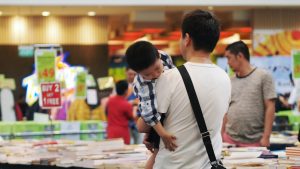Our graduates will have the edge: Linguistic entrepreneurship and the discourse of Mandarin enrichment centers in Singapore
September 9, 2021

Although Singapore touts English as its default lingua franca, Mandarin remains a compulsory subject for students of Chinese heritage, who make up about 75% of the Singaporean population. The majority of children of Chinese heritage receive no Mandarin exposure at home, yet are placed in the same classes and are expected to compete with children whose families do speak Mandarin at home. This includes a rising number of children whose families have immigrated recently from Mainland China and speak Mandarin as their dominant language.
While Singapore has always put forth meritocracy as a national value, its educational system has been challenged by the phenomenon of ‘parentocracy’, which refers to the intervention of parents in children’s educational outcomes. Since all Singaporean children, barring special need cases, are required to attend government schools and follow the national curriculum, the bulk of parental resources are focused on the enrichment and tuition sector, sometimes referred to as the ‘shadow education market’. A recent survey found that 43.6% of all Singaporean households with primary-school aged children sent their children to Mandarin enrichment or tuition, and 34.1% of families with pre-school aged children did the same.
Launched on 7 September 1979 by the then prime minister of Singapore, Lee Kuan Yew, the Speak Mandarin Campaign’s focus on the importance of learning Standard Mandarin for academic success led to a rise in anxiety regarding the possibility of transmitting ‘incorrect’ Mandarin to children. Many parents thus outsourced the task of Mandarin teaching to schools and enrichment centres instead.
In ‘Our graduates will have the edge: Linguistic entrepreneurship and the discourse of Mandarin enrichment centers in Singapore’ (Multilingua, 2020), Associate Professor Rebecca Lurie Starr and Dr Shrutika Kapoor (NUS Department of English Language and Literature) explore Mandarin ‘enrichment centres’ in Singapore and how they tap on the anxiety both parents and students feel about learning the language.
There are three distinct classes of Mandarin ‘enrichment centres’ – Traditional, Modern Traditional, and Anti-Traditional. Traditional centres highlight academic achievement, promising ‘exam-focused’ strategies to optimise school performance. Modern Traditional centres frame enrichment as an elite lifestyle choice, emphasising exclusivity and luxury, while Anti-Traditional centres distance themselves from conventional pedagogy, and invoke notions of holistic, experiential learning.
All three classes of centres claim to make the Mandarin learning process enjoyable – drawing from the shared understanding that many parents did not find their own Mandarin learning experiences enjoyable. A major theme observed in both Traditional and Modern Traditional centres was the notion of getting an edge over peers as a selling point. On the other hand, Anti-Traditional centres featured the rejection of traditional methods and overcoming fears on a child’s Mandarin learning journey. Yet, all three kinds of centres lack significant use of Chinese text and cultural imagery, and little discussion of the Chinese language itself. Because centres cater to families who are unable to exempt their children from compulsory Mandarin, there is no need for them to sell the language by touting its significance or the benefits of bilingualism. Instead, centres suggest various ways for parents to subvert the mainstream education system. Regardless of the approaches they advocate, enrichment centres share the common message that, by selecting their programme, parents can minimise the painful aspects of Mandarin learning for their children while successfully maximising their potential.
Read the article here.
